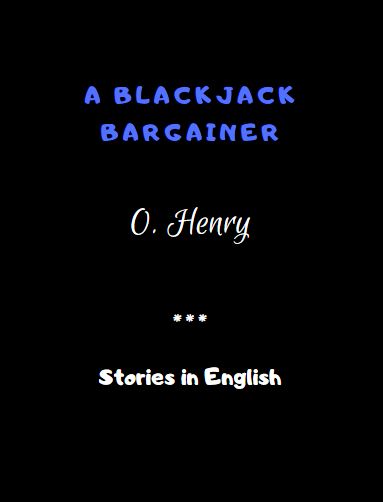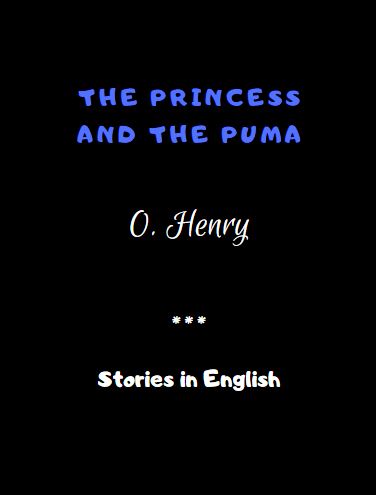
Recursos Educativos en Inglés - Stories in English
Cuentos clásicos en inglés
Blackjack Bargainer - O. Henry (1862-1910)
The most disreputable thing in Yancey Goree's law office was Goree himself, sprawled in his creaky old arm-chair. The rickety little office, built of red brick, was set flush with the street -- the main street of the town of Bethel.
Bethel rested upon the foot-hills of the Blue Ridge. Above it the mountains were piled to the sky. Far below it the turbid Catawba gleamed yellow along its disconsolate valley.
The June day was at its sultriest hour. Bethel dozed in the tepid shade. Trade was not. It was so still that Goree, reclining in his chair, distinctly heard the clicking of the chips in the grand-jury room, where the "court- house gang" was playing poker. From the open back door of the office a well-worn path meandered across the grassy lot to the court-house. The treading out of that path had cost Goree all he ever had -- first inheritance of a few thousand dollars, next the old family home, and, latterly the last shreds of his self-respect and manhood. The "gang" had cleaned him out. The broken gambler had turned drunkard and parasite; he had lived to see this day come when the men who had stripped him denied him a seat at the game. His word was no longer to be taken. The daily bouts at cards had arranged itself accordingly, and to him was assigned the ignoble part of the onlooker. The sheriff, the county clerk, a sportive deputy, a gay attorney, and a chalk-faced man hailing "from the valley," sat at table, and the sheared one was thus tacitly advised to go and grow more wool.
Soon wearying of his ostracism, Goree had departed for his office, muttering to himself as he unsteadily traversed the unlucky pathway. After a drink of corn whiskey from a demijohn under the table, he had flung himself into the chair, staring, in a sort of maudlin apathy, out at the mountains immersed in the summer haze. The little white patch he saw away up on the side of Blackjack was Laurel, the village near which he had been born and bred. There, also, was the birthplace of the feud between the Gorees and the Coltranes. Now no direct heir of the Gorees survived except this plucked and singed bird of misfortune. To the Coltranes, also, but one male supporter was left -- Colonel Abner Coltrane, a man of substance and standing, a member of the State Legislature, and a contemporary with Goree's father. The feud had been a typical one of the region; it had left a red record of hate, wrong and slaughter. But Yancey Goree was not thinking of feuds. His befuddled brain was hopelessly attacking the problem of the future maintenance of himself and his favourite follies. Of late, old friends of the family had seen to it that he had whereof to eat and a place to sleep -- but whiskey they would not buy for him, and he must have whiskey. His law business was extinct; no case had been intrusted to him in two years. He had been a borrower and a sponge, and it seemed that if he fell no lower it would be from lack of opportunity. One more chance -- he was saying to himself -- if he had one more stake at the game, he thought he could win; but he had nothing left to sell, and his credit was more than exhausted.
He could not help smiling, even in his misery, as he thought of the man to whom, six months before, he had sold the old Goree homestead. There had come from "back yan'" in the mountains two of the strangest creatures, a man named Pike Garvey and his wife. "Back yan'," with a wave of the hand toward the hills, was understood among the mountaineers to designate the remotest fastnesses, the unplumbed gorges, the haunts of lawbreakers, the wolf's den, and the boudoir of the bear. In the cabin far up on Blackjack's shoulder, in the wildest part of these retreats, this odd couple had lived for twenty years. They had neither dog nor children to mitigate the heavy silence of the hills. Pike Garvey was little known in the settlements, but all who had dealt with him pronounced him "crazy as a loon." He acknowledged no occupation save that of a squirrel hunter, but he "moonshined" occasionally by way of diversion. Once the "revenues" had dragged him from his lair, fighting silently and desperately like a terrier, and he had been sent to state's prison for two years. Released, he popped back into his hole like an angry weasel.
Fortune, passing over many anxious wooers, made a freakish flight into Blackjack's bosky pockets to smile upon Pike and his faithful partner.
One day a party of spectacled, knickerbockered, and altogether absurd prospectors invaded the vicinity of the Garvey's cabin. Pike lifted his squirrel rifle off the hooks and took a shot at them at long range on the chance of their being revenues. Happily he missed, and the unconscious agents of good luck drew nearer, disclosing their innocence of anything resembling law or justice. Later on, they offered the Garveys an enormous quantity of ready, green, crisp money for their thirty-acre patch of cleared land, mentioning, as an excuse for such a mad action, some irrelevant and inadequate nonsense about a bed of mica underlying the said property.
When the Garveys became possessed of so many dollars that they faltered in computing them, the deficiencies of life on Blackjack began to grow prominent. Pike began to talk of new shoes, a hogshead of tobacco to set in the corner, a new lock to his rifle; and, leading Martella to a certain spot on the mountain-side, he pointed out to her how a small cannon -- doubtless a thing not beyond the scope of their fortune in price -- might be planted so as to command and defend the sole accessible trail to the cabin, to the confusion of revenues and meddling strangers forever.
But Adam reckoned without his Eve. These things represented to him the applied power of wealth, but there slumbered in his dingy cabin an ambition that soared far above his primitive wants. Somewhere in Mrs. Garvey's bosom still survived a spot of femininity unstarved by twenty years of Blackjack. For so long a time the sounds in her ears had been the scaly-barks dropping in the woods at noon, and the wolves singing among the rocks at night, and it was enough to have purged her of vanities. She had grown fat and sad and yellow and dull. But when the means came, she felt a rekindled desire to assume the perquisites of her sex -- to sit at tea tables; to buy futile things; to whitewash the hideous veracity of life with a little form and ceremony. So she coldly vetoed Pike's proposed system of fortifications, and announced that they would descend upon the world, and gyrate socially.
And thus, at length, it was decided, and the thing done. The village of Laurel was their compromise between Mrs. Garvey's preference for one of the large valley towns and Pike's hankering for primeval solitudes. Laurel yielded a halting round of feeble social distractions comportable with Martella's ambitions, and was not entirely without recommendation to Pike, its contiguity to the mountains presenting advantages for sudden retreat in case fashionable society should make it advisable.
Their descent upon Laurel had been coincident with Yancey Goree's feverish desire to convert property into cash, and they bought the old Goree homestead, paying four thousand dollars ready money into the spendthrift's shaking hands.
Thus it happened that while the disreputable last of the Gorees sprawled in his disreputable office, at the end of his row, spurned by the cronies whom he had gorged, strangers dwelt in the halls of his fathers.
A cloud of dust was rolling, slowly up the parched street, with something travelling in the midst of it. A little breeze wafted the cloud to one side, and a new, brightly painted carryall, drawn by a slothful gray horse, became visible. The vehicle deflected from the middle of the street as it neared Goree's office, and stopped in the gutter directly in front of his door.
On the front seat sat a gaunt, tall man, dressed in black broadcloth, his rigid hands incarcerated in yellow kid gloves. On the back seat was a lady who triumphed over the June heat. Her stout form was armoured in a skintight silk dress of the description known as "changeable," being a gorgeous combination of shifting hues. She sat erect, waving a much-ornamented fan, with her eyes fixed stonily far down the street. However Martella Garvey's heart might be rejoicing at the pleasures of her new life, Blackjack had done his work with her exterior. He had carved her countenance to the image of emptiness and inanity; had imbued her with the stolidity of his crags, and the reserve of his hushed interiors. She always seemed to hear, whatever her surroundings were, the scaly-barks falling and pattering down the mountainside. She could always hear the awful silence of Blackjack sounding through the stillest of nights.
Goree watched this solemn equipage, as it drove to his door, with only faint interest; but when the lank driver wrapped the reins about his whip, awkwardly descended, and stepped into the office, he rose unsteadily to receive him, recognizing Pike Garvey, the new, the transformed, the recently civilized.
The mountaineer took the chair Goree offered him. They who cast doubts upon Garvey's soundness of mind had a strong witness in the man's countenance. His face was too long, a dull saffron in hue, and immobile as a statue's. Pale-blue, unwinking round eyes without lashes added to the singularity of his gruesome visage. Goree was at a loss to account for the visit.
"Everything all right at Laurel, Mr. Garvey?" he inquired.
"Everything all right, sir, and mighty pleased is Missis Garvey and me with the property. Missis Garvey likes yo' old place, and she likes the neighbourhood. Society is what she 'lows she wants, and she is getting' of it. The Rogerses, the Hapgoods, the Pratts and the Troys hev been to see Missis Garvey, and she hev et meals to most of thar houses. The best folks hev axed her to differ'nt kinds of doin's. I cyan't say, Mr. Goree, that sech things suits me -- fur me, give me them thar." Garvey's huge, yellow-gloved hand flourished in the direction of the mountains. "That's whar I b'long, 'mongst the wild honey bees and the b'ars. But that ain't what I come fur to say, Mr. Goree. Thar's somethin' you got what me and Missis Garvey wants to buy."
"Buy!" echoed Goree. "From me?" Then he laughed harshly. "I reckon you are mistaken about that. I reckon you are mistaken about that. I sold out to you, as you yourself expressed it, 'lock, stock and barrel.' There isn't even a ramrod left to sell."
"You've got it; and we 'uns want it. 'Take the money,' says Missis Garvey, 'and buy it fa'r and squared'.'"
Goree shook his head. "The cupboard's bare," he said.
"We've riz," pursued the mountaineer, undetected from his object, "a heap. We was pore as possums, and now we could hev folks to dinner every day. We been recognized, Missis Garvey says, by the best society. But there's somethin' we need we ain't got. She says it ought to been put in the 'ventory ov the sale, but it tain't thar. 'Take the money, then,' says she, 'and buy it fa'r and squar'."'
"Out with it," said Goree, his racked nerves growing impatient.
Garvey threw his slouch bat upon the table, and leaned forward, fixing his unblinking eyes upon Goree's.
"There's a old feud," he said distinctly and slowly, "'tween you 'uns and the Coltranes."
Goree frowned ominously. To speak of his feud to a feudist is a serious breach of the mountain etiquette. The man from "back yan'" knew it as well as the lawyer did.
"Na offense," he went on "but purely in the way of business. Missis Garvey hev studied all about feuds. Most of the quality folks in the mountains hev 'em. The Settles and the Goforths, the Rankins and the Boyds, the Silers and the Galloways, hev all been cyarin' on feuds f'om twenty to a hundred year. The last man to drap was when yo' uncle, Jedge Paisley Goree, 'journed co't and shot Len Coltrane f'om the bench. Missis Garvey and me, we come f'om the po' white trash. Nobody wouldn't pick a feud with we 'uns, no mo'n with a fam'ly of tree-toads. Quality people everywhar, says Missis Garvey, has feuds. We 'uns ain't quality, but we're uyin' into it as fur as we can. 'Take the money, then,' says Missis Garvey, 'and buy Mr. Goree's feud, fa'r and squar'.'"
The squirrel hunter straightened a leg half across the room, drew a roll of bills from his pocket, and threw them on the table.
"Thar's two hundred dollars, Mr. Goree; what you would call a fa'r price for a feud that's been 'lowed to run down like yourn hev. Thar's only you left to cyar' on yo' side of it, and you'd make mighty po' killin'. I'll take it off yo' hands, and it'll set me and Missis Garvey up among the quality. Thar's the money."
The little roll of currency on the table slowly untwisted itself, writhing and jumping as its folds relaxed. In the silence that followed Garvey's last speech the rattling of the poker chips in the court-house could be plainly heard. Goree knew that the sheriff had just won a pot, for the subdued whoop with which he always greeted a victory floated across the square upon the crinkly heat waves. Beads of moisture stood on Goree's brow. Stooping, he drew the wicker-covered demijohn from under the table, and filled a tumbler from it.
"A little corn liquor, Mr. Garvey? Of course you are joking about what you spoke of? Opens quite a new market, doesn't it? Feuds. Prime, two-fifty to three. Feuds, slightly damaged -- two hundred, I believe you said, Mr. Garvey?"
Goree laughed self-consciously.
The mountaineer took the glass Goree handed him, and drank the whisky without a tremor of the lids of his staring eyes. The lawyer applauded the feat by a look of envious admiration. He poured his own drink, and took it like a drunkard, by gulps, and with shudders at the smell and taste.
"Two hundred," repeated Garvey. "Thar's the money."
A sudden passion flared up in Goree's brain. He struck the table with his fist. One of the bills flipped over and touched his hand. He flinched as if something had stung him.
"Do you come to me," he shouted, "seriously with such a ridiculous, insulting, darned-fool proposition?"
"It's fa'r and squar'," said the squirrel hunter, but he reached out his hand as if to take back the money; and then Goree knew that his own flurry of rage had not been from pride or resentment, but from anger at himself, knowing that he would set foot in the deeper depths that were being opened to him. He turned in an instant from an outraged gentleman to an anxious chafferer recommending his goods.
"Don't be in a hurry, Garvey," he said, his face crimson and his speech thick. "I accept your p-p-proposition, though it's dirt cheap at two hundred. A t-trade's all right when both p-purchaser and b-buyer are s-satisfied. Shall I w-wrap it up for you, Mr. Garvey?"
Garvey rose, and shook out his broadcloth. "Missis Garvev will be pleased. You air out of it, and it stands Coltrane and Garvey. Just a scrap ov writin', Mr. Goree, you bein' a lawyer, to show we traded."
Goree seized a sheet of paper and a pen. The money was clutched in his moist hand. Everything else suddenly seemed to grow trivial and light.
"Bill of sale, by all means. 'Right, title, and interest in and to' . . . 'forever warrant and -- ' No, Garvey, we'll have to leave out that 'defend,'" said Goree with a loud laugh. "You'll have to defend this title yourself."
The mountaineer received the amazing screed that the lawyer handed him, folded it with immense labour, and laced it carefully in his pocket.
Goree was standing near the window. "Step here, said, raising his finger, "and I'll show you your recently purchased enemy. There he goes, down the other side of the street."
The mountaineer crooked his long frame to look through the window in the direction indicated by the other. Colonel Abner Coltrane, an erect, portly gentleman of about fifty, wearing the inevitable long, double-breasted frock coat of the Southern lawmaker, and an old high silk hat, was passing on the opposite sidewalk. As Garvey looked, Goree glanced at his face. If there be such a thing as a yellow wolf, here was its counterpart. Garvey snarled as his unhuman eyes followed the moving figure, disclosing long, amber-coloured fangs.
"Is that him? Why, that's the man who sent me to the penitentiary once!"
"He used to be district attorney," said Goree carelessly. "And, by the way, he's a first-class shot."
"I kin hit a squirrel's eye at a hundred yard," said Garvey. "So that thar's Coltrane! I made a better trade than I was thinkin'. I'll take keer ov this feud, Mr. Goree, better'n you ever did!"
He moved toward the door, but lingered there, betraying a slight perplexity.
"Anything else to-day?" inquired Goree with frothy sarcasm. "Any family traditions, ancestral ghosts, or skeletons in the closet? Prices as low as the lowest."
"Thar was another thing," replied the unmoved squirrel hunter, "that Missis Garvey was thinkin' of. 'Tain't so much in my line as t'other, but she wanted partic'lar that I should inquire, and ef you was willin', 'pay fur it,' she says, 'fa'r and squar'.' Thar's a buryin' groun', as you know, Mr. Goree, in the yard of yo' old place, under the cedars. Them that lies thar is yo' folks what was killed by the Coltranes. The monyments has the names on 'em. Missis Garvev says a fam'ly buryin' groun'- is a sho' sign of quality. She says ef we git the feud thar's somethin' else ought to go with it. The names on them moiivments is 'Goree,' but they can be changed to ourn by -- "
"Go. Go!" screamed Goree, his face turning purple. He stretched out both hands toward the mountaineer, his fingers hooked and shaking. "Go, you ghoul! Even a Ch-Chinaman protects the g-graves of his ancestors -- go!"
The squirrel hunter slouched out of the door to his carryall. While he was climbing over the wheel Goree was collecting, with feverish celerity, the money that had fallen from his hand to the floor. As the vehicle slowly turned about, the sheep, with a coat of newly grown wool, was hurrying, in indecent haste, along the path to the court-house.
At three o'clock in the morning they brought him back to his office, shorn and unconscious. The sheriff, the sportive deputy, the county clerk, and the gay attorney carried him, the chalk-faced man "from the valley" acting as escort.
"On the table," said one of them, and they deposited him there among the litter of his unprofitable books and papers.
"Yance thinks a lot of a pair of deuces when he's liquored up," sighed the sheriff reflectively.
"Too much," said the gay attorney. "A man has no business to play poker who drinks as much as he does. I wonder how much he dropped to-night."
"Close to two hundred. What I wonder is whar he got it. Yance ain't had a cent fur over a month, I know."
"Struck a client, maybe. Well, let's get home before daylight. He'll be all right when he wakes up, except for a sort of beehive about the cranium."
The gang slipped away through the early morning twilight. The next eye to gaze upon the miserable Goree was the orb of day. He peered through the uncurtained window, first deluging the sleeper in a flood of faint gold, but soon pouring upon the mottled red of his flesh a searching, white, summer heat. Goree stirred, half unconsciously, among the table's débris, and turned his face from the window. His movement dislodged a heavy law book, which crashed upon the floor. Opening his eyes, he saw, bending over him, a man in a black frock coat. Looking higher, he discovered a well-worn silk hat, and beneath it the kindly, smooth face of Colonel Abner Coltrane.
A little uncertain of the outcome, the colonel waited for the other to make some sign of recognition. Not in twenty years had male members of these two families faced each other in peace. Goree's eyelids puckered as he strained his blurred sight toward this visitor, and then he smiled serenely.
"Have you brought Stella and Lucy over to play?" he said calmly.
"Do you know me, Yancey?" asked Coltrane.
"Of course I do. You brought me a whip with a whistle in the end."
So he had -- twenty-four years ago; when Yancey's father was his best friend.
Goree's eyes wandered about the room. The colonel understood. "Lie still, and I'll bring you some," said he. There was a pump in the yard at the rear, and Goree closed his eyes, listening with rapture to the click of its handle, and the bubbling of the falling stream. Coltrane brought a pitcher of the cool water, and held it for him to drink. Presently Goree sat up -- a most forlorn object, his summer suit of flax soiled and crumpled, his discreditable head tousled and unsteady. He tried to wave one of his hands toward the colonel.
"Ex-excuse-everything, will you?" he said. "I must have drunk too much whiskey last night, and gone to bed on the table." His brows knitted into a puzzled frown.
"Out with the boys awhile?" asked Coltrane kindly.
"No, I went nowhere. I haven't had a dollar to spend in the last two months. Struck the demijohn too often. I reckon, as usual."
Colonel Coltrane touched him on the shoulder.
"A little while ago, Yancey," he began, "you asked me if I had brought Stella and Lucy over to play. You weren't quite awake then, and must have been dreaming you were a boy again. You are awake now, and I want you to listen to me. I have come from Stella and Lucy to their old playmate, and to my old friend's son. They know that I am going to bring you home with me, and you will find them as ready with a welcome as they were in the old days. I want you to come to my house and stay until you are yourself again, and as much longer as you will. We heard of your being down in the world, and in the midst of temptation, and we agreed that you should come over and play at our house once more. Will you come, my boy? Will you drop our old family trouble and come with me?"
"Trouble!" said Goree, opening his eyes wide. "There was never any trouble between us that I know of. I'm sure we've always been the best friends. But, good Lord, Colonel, how could I go to your home as I am -- a drunken wretch, a miserable, degraded spendthrift and gambler -- "
He lurched from the table into his armchair, and began to weep maudlin tears, mingled with genuine drops of remorse and shame. Coltrane talked to him persistently and reasonably, reminding him of the simple mountain pleasures of which he had once been so fond, and insisting upon the genuineness of the invitation.
Finally he landed Goree by telling him he was counting upon his help in the engineering and transportation of a large amount of felled timber from a high mountain-side to a waterway. He knew that Goree had once invented a device for this purpose -- a series of slides and chutes- upon which he had justly prided himself. In an instant the poor fellow, delighted at the idea of his being of use to any one, had paper spread upon the table, and was drawing rapid but pitifully shaky lines in demonstration of what he could and would do.
The man was sickened of the husks; his prodigal heart was turning again toward the mountains. His mind was yet strangely clogged, and his thoughts and memories were returning to his brain one by one, like carrier pigeons over a stormy sea. But Coltrane was satisfied with the progress he had made.
Bethel received the surprise of its existence that afternoon when a Coltrane and a Goree rode amicably together through the town. Side by side they rode, out from the dusty streets and gaping townspeople, down across the creek bridge, and up toward the mountain. The prodigal had brushed and washed and combed himself to a more decent figure, but he was unsteady in the saddle, and he seemed to be deep in the contemplation of some vexing problem. Coltrane left him in his mood, relying upon the influence of changed surroundings to restore his equilibrium.
Once Goree was seized with a shaking fit, and almost came to a collapse. He had to dismount and rest at the side of the road. The colonel, foreseeing such a condition, had provided a small flask of whisky for the journey but when it was offered to him Goree refused it almost with violence, declaring he would never touch it again. By and by he was recovered, and went quietly enough for a mile or two. Then he pulled up his horse suddenly, and said:
"I lost two hundred dollars last night, playing poker. Now, where did I get that money?"
"Take it easy, Yancey. The mountain air will soon clear it up. We'll go fishing, first thing, at the Pinnacle Falls. The trout are jumping there like bullfrogs. We'll take Stella and Lucy along, and have a picnic on Eagle Rock. Have you forgotten how a hickory-cured-ham sandwich tastes, Yancey, to a hungry fisherman?"
Evidently the colonel did not believe the story of his lost wealth; so Goree retired again into brooding silence.
By late Afternoon they had travelled ten of the twelve miles between Bethel and Laurel. Half a mile this side of Laurel lay the old Goree place; a mile or two beyond the village lived the Coltranes. The road was now steep and laborious, but the compensations were many. The tilted aisles of the forest were opulent with leaf and bird and bloom. The tonic air put to shame the pharmacopæia. The glades were dark with mossy shade, and bright with shy rivulets winking from the ferns and laurels. On the lower side they viewed, framed in the near foilage, exquisite sketches of the far valley swooning in its opal haze.
Coltrane was pleased to see that his companion was yielding to the spell of the hills and woods. For now they had but to skirt the base of Painter's Cliff; to cross Elder Branch and mount the hill beyond, and Goree would have to face the squandered home of his fathers. Every rock he passed, every tree, every foot of the rocky way, was familiar to him. Though he hid forgotten the woods, they thrilled him like the music of "Home, Sweet Home."
They rounded the cliff, decended into Elder Branch, and paused there to let the horses drink and splash in the swift water. On the right was a rail fence that cornered there, and followed the road and stream. Inclosed by it was the old apple orchard of the home place; the house was yet concealed by the brow of the steep hill. Inside and along the fence, pokeberries, elders, sassafras, and sumac grew high and dense. At a rustle of their branches, both Goree and Coltrane glanced up, and saw a long, yellow, wolfish face above the fence, staring at them with pale, unwinking eyes. The head quickly disappeared; there was a violent swaying of the bushes, and an ungainly figure ran up through the apple orchard in the direction of the house, zigzagging among the trees.
"That's Garvey," said Coltrane; "the man you sold out to. There's no doubt but he's considerably cracked. I had to send him up for moonshining, once, several years ago, in spite of the fact that I believed him irresponsible. Why, what's the matter, Yancey?"
Goree was wiping his forehead, and his face had lost its colour. "Do I look queer, too?" he asked, trying to smile. "I'm just remembering a few more things." Some of the alcohol had evaporated from his brain. "I recollect now where I got that two hundred dollars."
"Don't think of it," said Coltrane cheerfully. "Later on we'll figure it all out together."
They rode out of the branch, and when they reached the foot of the hill Goree stopped again.
"Did you ever suspect I was a very vain kind of fellow, Colonel" he asked. "Sort of foolish proud about appearances?"
The colonel's eyes refused to wander to the soiled, sagging suit of flax and the faded slouch hat.
"It seems to me," he replied, mystified, but humouring him, "I remember a young buck about twenty, with the tightest coat, the sleekest hair, and the prancingest saddle horse in the Blue Ridge."
"Right you are," said Goree eagerly. "And it's in me yet, though it don't show. Oh, I'm as vain as a turkey gobbler, and as proud as Lucifer. I'm going to ask you to indulge this weakness of mine in a little matter."
"Speak out, Yancey. We'll create you Duke of Laurel and Baron of Blue Ridge, if you choose; and you shall have a feather out of Stella's peacock's tail to wear in your hat."
"I'm in earnest. In a few minutes we'll pass the house up there on the hill where I was born, and where my people have lived for nearly a century. Strangers live there now -- and look at me! I am about to show myself to them ragged and poverty-stricken, a wastrel and a beggar. Colonel Coltrane, I'm ashamed to do it. I want you to let me wear your coat and hat until we are out of sight beyond. I know you think it a foolish pride, but I want to make as good a showing as I can when I pass the old place."
"Now, what does this mean?" said Coltrane to himself, as he compared his companion's sane looks and quiet demeanour with his strange request. But he was already unbuttoning the coat, assenting readily, as if the fancy were in no wise to be considered strange.
The coat and hat fitted Goree well. He buttoned the former about him with a look of satisfaction and dignity. He and Coltrane were nearly the same size -- rather tall, portly, and erect. Twenty-five years were between them, but in appearance they might have been brothers. Goree looked older than his age; his face was puffy and lined; the colonel had the smooth, fresh complexion of a temperate liver. He put on Goree's disreputable old flax coat and faded slouch hat.
"Now," said Goree, taking up the reins, "I'm all right. I want you to ride about ten feet in the rear as we go by, Colonel, so that they can get a good look at me. They'll see I'm no back number yet, by any means. I guess I'll show up pretty well to them once more, anyhow. Let's ride on."
He set out up the hill at a smart trot, the colonel following, as he had been requested.
Goree sat straight in the saddle, with head erect, but his eyes were turned to the right, sharply scanning every shrub and fence and hiding-place in the old homestead yard. Once he muttered to himself, "Will the crazy fool try it, or did I dream half of it?"
It was when he came opposite the little family burying ground that he saw what he had been looking for -- a puff of white smoke, coming from the thick cedars in one corner. He toppled so slowly to the left that Coltrane had time to urge his horse to that side, and catch him with one arm.
The squirrel hunter had not overpraised his aim. He had sent the bullet where he intended, and where Goree had expected that it would pass - through the breast of Colonel Abner Coltrane's black frock coat.
Goree leaned heavily against Coltrane, but he did not fall. The horses kept pace, side by side, and the Colonel's arm kept him steady. The little white houses of Laurel shone through the trees, half a mile away. Goree reached out one hand and groped until it rested upon Coltrane's fingers, which held his bridle.
"Good friend," he said, and that was all.
Thus did Yancey Goree, as be rode past his old home, make, considering all things, the best showing that was in his power.




